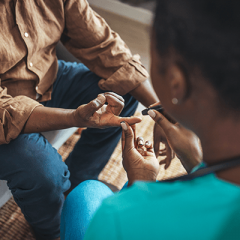UQ Poche Centre for Indigenous Health Senior Research Fellow Dr Carmen Parter recently received the Emerging Voices in Indigenous Scholarship/Researcher Award by the Indigenous Inquiries Circle (IIC) of the International Congress of Qualitative Inquiry Conference in Canada.
This award recognises outstanding scholars and researchers who honour community and Indigenous ways of researching.
Dr Parter is a proud Murri woman from the Darumbal and Juru clans of the Birra Gubba Nation in Queensland with South Sea Islander heritage from Tanna Island in Vanuatu. She was recognised for her scholarly work and journal article, ‘My research is my story.’
How did you react when you found out you won this award?
I was really speechless. My research honours community and our ways of being, knowing and doing. It’s been very clear about putting into practice those fundamental cultural principals of respect, responsibility, relationality, reciprocity, and reverence. There’s a whole cultural obligation as an Aboriginal researcher to do things in the right way. These accountabilities are informed by our culture and the way that we see things and view the world. It’s really bringing to light, in a scholarly way and within a Western paradigm, something that authenticates who we are as Indigenous people. I was really chuffed to get that recognition, pretty proud actually.
What are your main areas of research?
My real interest is about how we implement our culture in healthcare practice and services. When I was working as a nurse, I noticed policies for our Mob were not appropriate. So, I made a deliberate career move into policy because I wanted to influence governments to incorporate our world view. It was really exciting because governments began to listen and understand that our culture is critical to policy.
What makes this such an important area of research?
My research brings visibility to our world view, particularly around scholarly knowledge and evidence concerning Indigenous data analysis methodologies.
We often talk about the need to apply Indigenous philosophy and methodologies into the way we do our research. We build that into our research, we collect our data, and then when we’ve got our data we use a Western science model of analysing that data.
That was one of the biggest challenges for me when I was doing my PhD. I was using an Indigenous research methodology of storying, which is yarning and stories, and all the cultural obligations that underpin that, such as being responsible, respectful, and reciprocating and retelling the stories to give voice to the people. My contribution to the scholarly knowledge is to show people how to analyse stories from an Indigenous paradigm and standpoint.
How does your research contribute to closing the gap?
I’d say it has already contributed to it, particularly in the health arena. We talk about cultural determinants of health. That’s essentially what my PhD is about – how you implement the cultural determinants of health into health policy or programs and services.
At the moment it is a policy commitment and my role and responsibility is to continue this work in this space to make it better for future generations, like my grandkids, to ensure that they have a better life, that they don’t have to put up with the things that I’ve put up with.
Our Western system is based on public policies and Western ways of knowing, being and doing and so we work in two worlds. I see it as our responsibility to decolonise western worlds. When you work in white systems you inevitably become white if you don’t look after yourself and protect yourself How do you allow your Blackness, your Indigeneity to be front and centre to everything that you do? There’s always going to be tensions with that whiteness. It’s a challenge yes, but you just grow from it.
Why are you passionate about this area of research?
My passion is to continue to theorise this, but it’s also about the grannies – future generations. And what I love about our Mob is that we work in spaces like this but it’s not about us. It’s about our community. Whatever we do, it’s always about our community.



